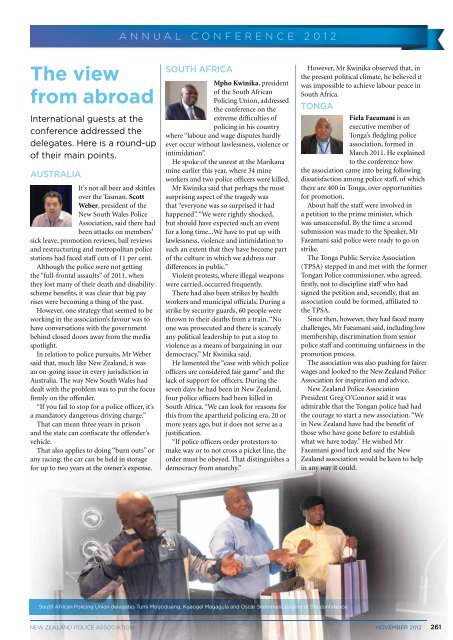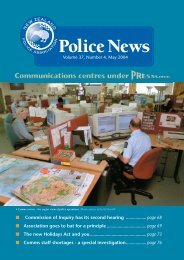2012-11 - New Zealand Police Association
2012-11 - New Zealand Police Association
2012-11 - New Zealand Police Association
You also want an ePaper? Increase the reach of your titles
YUMPU automatically turns print PDFs into web optimized ePapers that Google loves.
ANNUAL CONFERENCE <strong>2012</strong>The viewfrom abroadInternational guests at theconference addressed thedelegates. Here is a round-upof their main points.AUSTRALIAIt’s not all beer and skittlesover the Tasman. ScottWeber, president of the<strong>New</strong> South Wales <strong>Police</strong><strong>Association</strong>, said there hadbeen attacks on members’sick leave, promotion reviews, bail reviewsand restructuring and metropolitan policestations had faced staff cuts of <strong>11</strong> per cent.Although the police were not gettingthe “full-frontal assaults” of 20<strong>11</strong>, whenthey lost many of their death and disabilityscheme benefits, it was clear that big payrises were becoming a thing of the past.However, one strategy that seemed to beworking in the association’s favour was tohave conversations with the governmentbehind closed doors away from the mediaspotlight.In relation to police pursuits, Mr Webersaid that, much like <strong>New</strong> <strong>Zealand</strong>, it wasan on-going issue in every jurisdiction inAustralia. The way <strong>New</strong> South Wales haddealt with the problem was to put the focusfirmly on the offender.“If you fail to stop for a police officer, it’sa mandatory dangerous driving charge.”That can mean three years in prisonand the state can confiscate the offender’svehicle.That also applies to doing “burn outs” orany racing; the car can be held in storagefor up to two years at the owner’s expense.SOUTH AFRICAMpho Kwinika, presidentof the South AfricanPolicing Union, addressedthe conference on theextreme difficulties ofpolicing in his countrywhere “labour and wage disputes hardlyever occur without lawlessness, violence orintimidation”.He spoke of the unrest at the Marikanamine earlier this year, where 34 mineworkers and two police officers were killed.Mr Kwinika said that perhaps the mostsurprising aspect of the tragedy wasthat “everyone was so surprised it hadhappened”. “We were rightly shocked,but should have expected such an eventfor a long time...We have to put up withlawlessness, violence and intimidation tosuch an extent that they have become partof the culture in which we address ourdifferences in public.”Violent protests, where illegal weaponswere carried, occurred frequently.There had also been strikes by healthworkers and municipal officials. During astrike by security guards, 60 people werethrown to their deaths from a train. “Noone was prosecuted and there is scarcelyany political leadership to put a stop toviolence as a means of bargaining in ourdemocracy,” Mr Kwinika said.He lamented the “ease with which policeofficers are considered fair game” and thelack of support for officers. During theseven days he had been in <strong>New</strong> <strong>Zealand</strong>,four police officers had been killed inSouth Africa. “We can look for reasons forthis from the apartheid policing era, 20 ormore years ago, but it does not serve as ajustification.“If police officers order protestors tomake way or to not cross a picket line, theorder must be obeyed. That distinguishes ademocracy from anarchy.”However, Mr Kwinika observed that, inthe present political climate, he believed itwas impossible to achieve labour peace inSouth Africa.TONGAFiela Faeamani is anexecutive member ofTonga’s fledgling policeassociation, formed inMarch 20<strong>11</strong>. He explainedto the conference howthe association came into being followingdissatisfaction among police staff, of whichthere are 400 in Tonga, over opportunitiesfor promotion.About half the staff were involved ina petition to the prime minister, whichwas unsuccessful. By the time a secondsubmission was made to the Speaker, MrFaeamani said police were ready to go onstrike.The Tonga Public Service <strong>Association</strong>(TPSA) stepped in and met with the formerTongan <strong>Police</strong> commissioner, who agreed,firstly, not to discipline staff who hadsigned the petition and, secondly, that anassociation could be formed, affiliated tothe TPSA.Since then, however, they had faced manychallenges, Mr Faeamani said, including lowmembership, discrimination from seniorpolice staff and continuing unfairness in thepromotion process.The association was also pushing for fairerwages and looked to the <strong>New</strong> <strong>Zealand</strong> <strong>Police</strong><strong>Association</strong> for inspiration and advice.<strong>New</strong> <strong>Zealand</strong> <strong>Police</strong> <strong>Association</strong>President Greg O’Connor said it wasadmirable that the Tongan police had hadthe courage to start a new association. “Wein <strong>New</strong> <strong>Zealand</strong> have had the benefit ofthose who have gone before to establishwhat we have today.” He wished MrFaeamani good luck and said the <strong>New</strong><strong>Zealand</strong> association would be keen to helpin any way it could.South African Policing Union delegates Tumi Mogodiseng, Kgaogel Magagula and Oscar Skommere singing at the conference.new zealand police aSSOCIATION november <strong>2012</strong> 261

















